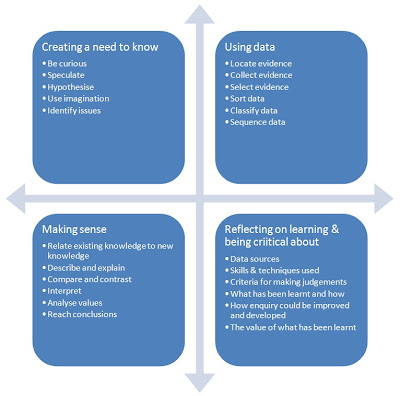One of the most useful tools in the teachers’ toolkit is the work of Margaret Roberts and her ‘cycle of geographical enquiry’. The cycle is powered by children’s curiosity. The question ‘Why?’ is asked early, and repeatedly, by children before they even start school. Hopefully that spirit of enquiry is encouraged and nurtured once they start school, so that they don’t get out of the habit of questioning.
The starting point for a lesson sequence should be a series of questions. ‘Why’ can be joined by ‘When’, ‘Where’, ‘What’ and ‘Who’. You may also be able to think of others. Questions could come from negotiation with students, who must also develop strategies for answering them appropriately. Remember that students don’t necessarily “know what they don’t know”, so there is still a need for subject specialists such as yourselves to choose the key questions to ensure that the learning has breadth as well as depth.
In geography there is a whole world of questions to select of course. Questions should create a ‘need to know’ and have what Liz Taylor, author of ‘Representing Geography’ has called ‘pith and rigour’. They might ask what can be seen in an image or consider what might happen in the future. They should be ‘open’, and offer chances for analysis.
Rachel Lofthouse of Newcastle University describes the use of what she calls BGQ’s (Big Geographical Questions) These might include a question like “Why do people live where they do?”, which will still be asked in twenty years time. Alternatively, they might be more intriguing, such as “Where does London end?”
 |
| Copyright: Geographical Association |
Further questions will then arise from the use of geographical skills that follows. The selection of supportive geo-media such as images to help answer the questions will involve discussions and generate further questions. For example, “How much of Rio de Janeiro is made up of slum housing?”, or “Will the World Cup in 2014 change Rio for the better?”.
For Tom Biebrach, who teaches at Howells School in Wales, these explorations are “the framework that geographers use to understand the complex world”. Enquiry must involve fieldwork where possible, and provide opportunities for pupils to communicate their ideas and findings in creative ways.
Using enquiry enables teachers to ‘tick the PLTS box’, and is at the heart of the Teacher Effectiveness Enhancement Programme (TEEP) which is run by the School’s Network and is being introduced into some schools. Tony Cassidy, who teaches at Kirk Hallam in Derbyshire suggests that questions enable students to ‘travel through the lesson’, and also offer opportunities to validate sources and ultimately participate in practical action. He uses his personal experience of a teacher exchange to Japan to ask “Would we students enjoy schooling Japanese style?”, followed by the creation of questions which are e-mailed to Japanese students for them to answer.
Researchers Morgan and Saxton (1991) reckoned a typical teacher asked between 300 and 400 questions a day. Maybe it is time to ask fewer, smarter questions? Why not ask a student to monitor how many you ask in the first half hour of the lesson? Once those initial questions have been carefully chosen, geographical enquiry, carried out thoroughly, offers a framework for the production of another new narrative in geography’s ongoing aim of ‘writing the Earth’.
References
You might find these two books really helpful:
‘Geography inside the Black Box’ – Paul Weeden & David Lambert (nferNelson, 2006)
‘Learning through Enquiry’ – Margaret Roberts (Geographical Association, 2003)
URL
This resource on the GA website provides more useful background on enquiry and questions…
http://www.geography.org.uk/gtip/thinkpieces/geographicalenquiry
Alan Parkinson
Secondary Curriculum Development Leader of the Geographical Association


